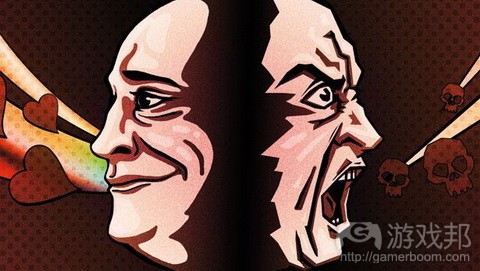玩家和开发者是游戏作品的联合所有者?
游戏所有权掌握在谁手中?开发者?玩家?——N’Gai Croal
在《Quake Live》2009年公开测试之际,我有幸同游戏执行制作人Marty Stratton碰面。我们谈论的话题之一是《雷神之锤 3:竞技场》玩家存在惊人的游戏所有感,若这些粉丝大动肝火,应对他们将是一大挑战。出于某些原因,游戏在地图和武器方面做出调整,但依然有某些用户心存不满,觉得《Quake Live》应效仿《雷神之锤 3:竞技场》。
在他看来,在疯狂粉丝的监督下制作游戏有些令人心惊胆寒,团队中的年轻成员在面对众多《雷神之锤 3:竞技场》监督者时更是倍感压力。这令我忍不住想到:“我很好奇这会是种什么情况:有些玩家每天都玩这款原版游戏,因此他们对游戏的了解比《雷神之锤 3:竞技场》工作人员或《Quake Live》开发人士更甚?”
“fan”(粉丝)其实是“fanatic”(狂热者)的简称。从某种程度看,开发者和发行商其实都希望从用户身上激发其狂热情感。从有关视频游戏技术平台的讨论内容来看,粉丝其实是风靡作品的运作平台。没有他们的持久粘性,即便是最庞大的作品和神话也会最终消失(游戏邦注:不妨看看塑料装置游戏过去几年来的发展),这也是社区管理越发变成行业必要组成元素的原因所在。
社区管理装置带来的一个意外结果是某些旨在拉近开发者和粉丝距离的工具也开始给予粉丝同开发者相当的论坛地位。数据及网络连接性将曾经遍布各地但存在共同兴趣的用户汇聚起来,开始扭转局面,将开发者的主导地位转移到粉丝群体身上。
《纽约客》在四月份发表了关于科幻小说家George RR Martin的事迹,其《冰与火之歌》系列著作已被拍摄成HBO电视连续剧,视频游戏内容也正在制作中。文章主要谈论两类Martin迷关于第四和第五部著作间隔6年的不同看法。一类是Brotherhood Without Banner,Martin的狂热粉丝,他们强调Martin发行之路的艰辛,表示会始终持支持态度。另一类则是Martin的反粉丝组织,他们喜欢此系列的著作,但由于缺乏耐心,受不了遥遥无期的等待,因此此感情逐步转变成讽刺、训斥、嘲笑和批评。
我曾经是电视连续剧《Lost》的忠实粉丝,因此也算得上存在某种联系。尽管姐姐警告我,就之前作品来看,JJ Abrams和他的团队很难坚持始终如一,最后你会发现内容越来越牵强附合,荒谬可笑,直到现在当社交网络提到相关内容时,我依然无法抵挡诱惑,还是会浏览。
《纽约客》对该故事进行如下陈述:Martin面临的在线炮轰表明,某些读者就作者应向他们呈现什么内容有自己的新看法。他们将自己当作消费者,而非忠实粉丝,他们想要即时、连贯的服务。Martin(游戏邦注:现年62岁)表示,其助手将这些愤愤不平的读者称作Entitlement Generation。“他觉得这些都是年轻人,20出头。这代人坚持自己的所想,他们希望能够立即满足自己的期望。若你无法做到,他们就会表现出不满。”
这是一大发现,但还不够深入。虽然这些看法足以体现“顾客永远是对的”理念,但我觉得粉丝在某项作品中的投入越多(包含金钱、时间和感情),他们就越觉得自己是其中的投资者或股东。这些粉丝并未将自己看作用户,而是把自己当作赞助人。若他们是项目的一份子,是不是在作品制作方面也有发言权?
独立游戏继续由单机产品转变成服务;随着它们更多依赖于订阅、用户生成内容、社交互动之类的元素,操纵粉丝和反粉丝组织的风险&回报就越突出。有某观点认为,设计师和玩家是游戏体验的共同作者。在21世纪我们也许还得将他们看作联合所有者。(本文为游戏邦/gamerboom.com编译,拒绝任何不保留版权的转载,如需转载请联系:游戏邦)
Opinion: Whose game is it anyway?
Who really owns a game, asks N’Gai Croal, its creator or the people who play it?
In the run up to the 2009 public beta for Quake Live, I met with the game’s executive producer, Marty Stratton. One topic of discussion was the tremendous sense of ownership that longtime Quake III Arena players felt towards the game, and what a challenge it could be to deal with some of those fans when they were up in arms. For a variety of reasons, tweaks and changes were made to maps and weapons, but there was a contingent that simply wouldn’t be satisfied unless Quake Live was exactly like Quake III Arena had been.
To hear him tell it, developing under that kind of scrutiny from a rabid fanbase could be somewhat intimidating, mostly for the younger members of the team, when confronted by one or more Quake III Arena vets. Which prompted me to remark, “I wonder what that’s like, knowing that there are guys out there who may have literally played the original game every day, and as a result they may in fact know the game better than anyone who worked on Quake III Arena or who is working on Quake Live?”
The word ‘fan’, is, of course, short for ‘fanatic.’ And on some level, most developers and publishers want to elicit the devotion of the fanatic from their audience. Because for all the talk of technological platforms in the videogame industry, fans are the platform upon which blockbusters are built. Without their sustained engagement, even the biggest franchises and phenomena can vanish – just look at what happened to the plastic-instrument game over the past couple of years – which is why community management has become an increasingly essential part of the industry.
One of the unforeseen consequences of the community management apparatus is that the same tools that are used to bring creators closer to their fans – blogs, message boards, Facebook, Twitter – also have the effect of putting fans on the same level as creators within those forums. Once there, sheer numbers and the coalescent ability of the internet to bring together once far-flung people with common interests start to tilt the balance of power – or at least, the power of public opinion – away from the creator and towards their fanbase.
This was the subject of an April New Yorker story about fantasy novelist George RR Martin, whose A Song Of Fire and Ice series of books have been turned into an HBO TV series, with videogames in the works as well. The article examined the disparate responses of two groups of Martin aficionados to the six-year gap between the fourth and fifth novels in the series (the fifth book, A Dance With Dragons, is planned to be published this year). On one hand are the Brotherhood Without Banner, Martin’s incredibly patient fans who empathise with his long slog towards publication and have remained loyal throughout. On the other hand are Martin’s anti-fans, whose love for the series, owing to their impatience with what was a delay with no end in sight, has spread into sarcasm, haranguing, parody, ridicule and vitriol.
Hell, it seems, hath no fury like a fan scorned. As a one-time fan of the TV series Lost, I can myself relate. Having started to watch the show despite my sister’s warning that based on the evidence of their prior work, JJ Abrams and his team would be unable to stick the landing, only to see it become increasingly far-fetched and risible in its latter years, to this day I still find it difficult to resist taking shots at the show when it’s mentioned on the social networks I frequent.
This prompts the following passage in the New Yorker story: ‘The online attacks on Martin suggest that some readers have a new idea about what an author owes them. They see themselves as customers, not devotees, and they expect prompt, consistent service. Martin, who is 62, told me that [his assistant] calls the disaffected readers the Entitlement Generation. “He thinks they’re all younger people, teens and 20s. And that generation just wants what they want, and they want it now. If you don’t give it to them, they’re pissed off.”’
It’s a good observation, but it doesn’t go far enough. Even though these attitudes seem indicative of a The Customer Is Always Right mentality, I’d argue that the more that fans invest of themselves in a particular work – an investment not merely of money, but also of time and emotion – the more they see themselves as investors, or shareholders in the ongoing development of the work. These fans don’t think of themselves as the audience, but as patrons. And if they own the work, shouldn’t they have a say in how it’s made?
As individual games continue to evolve from standalone products to services; as they become more reliant on subscriptions, user-generated content, social interactions and the like, the more significant the risks and rewards of navigating the twin poles of fans and anti-fans. There’s a school of thought that says that the designer and the player have always been co-authors of the game experience. In the 21st century, we may have to consider them co-owners as well.(Source:next-gen)








































 闽公网安备35020302001549号
闽公网安备35020302001549号